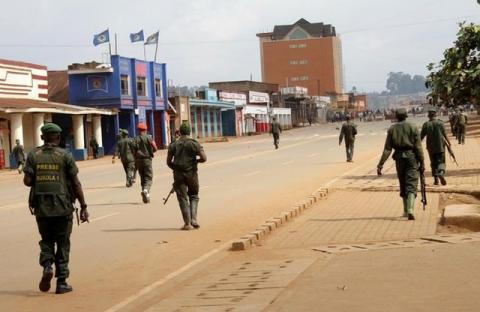Advertisement
Congolese soldiers kill at least 101 in militia clashes - U.N
GENEVA (Reuters) - Soldiers targeting the Kamwina Nsapu militia group in central Democratic Republic of Congo killed at least 101 people between Feb. 9 and Feb. 13, including 39 women, the U.N. said on Tuesday.
The soldiers fired indiscriminately with machine guns when they saw the militia fighters, who were armed mainly with machetes and spears, human rights spokeswoman Liz Throssell said, citing sources in the country.
"We are deeply concerned at the reported high number of deaths, which if confirmed would suggest excessive and disproportionate use of force by the soldiers," she said.
Hundreds have died and tens of thousands have been uprooted in central Congo in recent months in battles between security forces and the militia, who are seeking to avenge the death of their leader Kamwina Nsapu.
He was killed by the Congolese armed forces last August, after vowing to rid Congo's Kasai-Central province of all state security forces, accusing them of abusing the local population.
"It appears that since then the militia have become radicalised and they are attacking state institutions, what they see as the symbols of the state. The actual roots of the conflict are very deep and very complex," Throssell said.
The authority of some customary chiefs is recognised by the government and can be passed from father to son, but Kamwina Nsapu was not officially recognised.
Analysts say militia violence in Congo, a tinderbox of conflicts linked to land, ethnicity and mineral resources, has been exacerbated by President Joseph Kabila's failure to step down when his constitutional mandate expired in December.
Throssell did not have an estimate of the total size of the Kamwina Nsapu militia, but said there had been several attacks involving over 100 militia members.
"They have a lot of popular support," she added.
Many of the militia fighters are children but Throssell could not confirm if children were among the dead. The majority of the dead were thought to be militia members, but 39 women were caught in the firing line and killed during an incident in a market on Feb. 9, she said.
The clashes took place in and around the town of Tshimbulu, about 160 km (100 miles) south of the provincial capital Kananga, she said.
(Reporting by Tom Miles; Editing by Louise Ireland and Pritha Sarkar)



















Add new comment